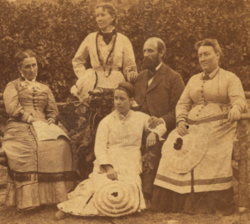| Mormonism and polygamy |
|---|
 |
|
|
The Edmunds Act, also known as the Edmunds Anti-Polygamy Act of 1882,[1] is a United States federal statute, signed into law on March 23, 1882, declaring polygamy a felony. The act is named for U.S. Senator George F. Edmunds of Vermont. The Edmunds Act prohibited "unlawful cohabitation", thus removing the need to prove that actual marriages had occurred.[2] It was passed in a wave of Victorian-era reaction to the perceived immorality of polygamy, or at least polygyny, which was often compared to slavery.[3]
The act not only reinforced the 1862 Morrill Anti-Bigamy Act but also revoked polygamists' right to vote, made them ineligible for jury service, and prohibited them from holding political office.
The law was applied in an apparently ex post facto manner; that is, polygamists were charged for polygamist marriages solemnized before passage of the statute. A constitutional challenge to the statute was framed on these and other grounds. The Supreme Court ruled, in Murphy v. Ramsey, 114 U.S. 15 (1885), that the statute was not ex post facto because convicts were charged for their continued cohabitation, not for the prior illegal marriage. Modern scholarship suggests the law may be unconstitutional for being in violation of the Free Exercise Clause,[4], although the Supreme Court has repeatedly ruled that neutral laws that happen to impinge on some religious practices are constitutional.
The Edwards Act restrictions were enforced regardless of whether an individual was actually practicing polygamy, or merely believed in the Mormon doctrine of plural marriage without actually participating in it.
All elected offices in the Utah Territory were vacated, an election board was formed to issue certificates to those who both denied polygamy and did not practice it, and new elections were held territory-wide.